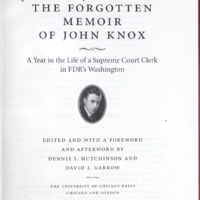-
Title
-
The forgotten memoir of John Knox : a year in the life of a Supreme Court clerk in FDR's Washington
-
Description
-
The Forgotten Memoir of John Knox - edited by Dennis J. Hutchinson and David J. Garrow - offers a candid, at times naive, insider's view of the showdown between Roosevelt and the Court that took place in 1937. At the same time, it marvelously portrays a Washington culture now long gone. Although the new Supreme Court building had been open for a year by the time Knox joined McReynolds' staff, most of the justices continued to work from their homes, each supported by a small staff. Knox, the epitome of the overzealous and officious young man, after landing what he believes to be a dream position, continually fears for his job under the notoriously rude (and nakedly racist) justice.But he soon develops close relationships with the justice's two black servants: Harry Parker, the messenger who does everything but breathe" for the justice, and Mary Diggs, the maid and cook. Together, they plot and sidestep around their employer's idiosyncrasies to keep the household running while history is made in the Court." "A foreword by Dennis Hutchinson and David Garrow sets the stage, and a gallery of period photos of Knox, McReynolds, and other figures of the time gives life to this engaging account, which like no other captures life in Washington, D.C., when it was still a genteel southern town."--BOOK JACKET.
-
Identifier
-
1016712
-
226448622
-
Creator
-
Knox, John
-
Contributor
-
Hutchinson, Dennis J
-
Garrow, David J
-
Source
-
Brian Lamb Booknotes Collection
-
Gift of Brian Lamb, 2011.
-
Catalog record
-
Language
-
eng
-
Date
-
2002
-
Program air date: September 8, 2002
-
Publisher
-
University of Chicago Press
-
George Mason University. Libraries. Special Collections & Archives
-
Text
-
Transcription of Annotations
Notes and front and back endpapers show Justice James C. McReynolds to be racist, stingy, and inconsiderate. For example, he ordered John Knox to stop being friendly with Harry and Mary, who were black. In another instance Knox writes that he was told by McReynolds to write an opinion over the weekend which the judge then threw away. When Judge Cardozo died suddenly of a heart attack, McReynolds didn't want to go to court for a tribute Cardozo. Other notes refer to "The red book", which contains votes and is burned every year; the Supreme Court's two-tiered approach to the law, which is the theoretical axis of modern judicial review: 1) leave control of economy to states and Congress; 2) but use its power to protect rights and groups, religion, speech and minorities; a bill that would give FDR the "authority to name an additional federal judge for every incumbent who had been on the bench for at least ten years and who had not resigned within six months after reaching seventy years of age". Two Supreme Court decisions are referred to in the notes: the Minimum Wage decision, where the Court reversed itself, and the General Welfare decision on May 24, 1937. -- These statements are part of the notes: "[Knox] had a dozen letters from Brandeis; [he] met Holmes at his Beverly Farms home; [he] met Alger Hiss in his Washington home." - "[McReynolds] wouldn't let Knox et al listen to the King's abdication speech; Knox's opinion of McReynolds went down another notch." -- Annotations by Brian Lamb in the margins and underlining of pertinent phrases throughout the book.
-
Subject
-
"Knox, John, 1907-1997."
-
"United States. Supreme Court--Employees--Biography."
-
"United States. Supreme Court--History."
-
"Law clerks--United States--Biography."
-
Relation
-
Original Booknotes interview
-
Rights
-
This work may be protected by copyright laws and is provided for educational and research purposes only. Any infringing use may be subject to disciplinary action and/or civil or criminal liability as provided by law. If you believe that you are the rights-holder and object to Mason’s use of this image, please contact speccoll@gmu.edu.
 1016712.pdf
1016712.pdf